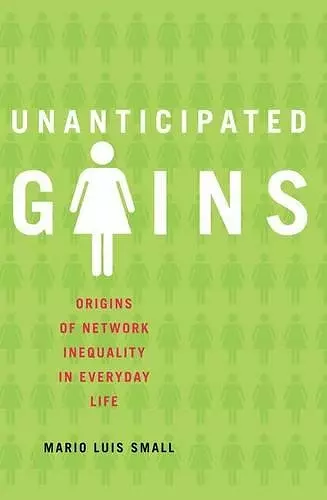Unanticipated Gains
Origins of Network Inequality in Everyday Life
Format:Paperback
Publisher:Oxford University Press Inc
Published:25th Nov '10
Currently unavailable, currently targeted to be due back around 25th January 2025, but could change
This paperback is available in another edition too:
- Hardback£42.49(9780195384352)

Social capital theorists have shown that some people do better than others in part because they enjoy larger, more supportive, or otherwise more useful networks. But why do some people have better networks than others? Unanticipated Gains argues that the practice and structure of the churches, colleges, firms, gyms, childcare centers, and schools in which people happen to participate routinely matter more than their deliberate "networking." Exploring the experiences of New York City mothers whose children were enrolled in childcare centers, this book examines why a great deal of these mothers, after enrolling their children, dramatically expanded both the size and usefulness of their personal networks. Whether, how, and how much the mother's networks were altered--and how useful these networks were--depended on the apparently trivial, but remarkably consequential, practices and regulations of the centers. The structure of parent-teacher organizations, the frequency of fieldtrips, and the rules regarding drop-off and pick-up times all affected the mothers' networks. Relying on scores of in-depth interviews with mothers, quantitative data on both mothers and centers, and detailed case studies of other routine organizations, Small shows that how much people gain from their connections depends substantially on institutional conditions they often do not control, and through everyday processes they may not even be aware of. Emphasizing not the connections that people make, but the context in which they are made, Unanticipated Gains presents a major new perspective on social capital and on the mechanisms producing social inequality.
Child care centers are not just about caring for children. Rather, under the right circumstances, they also foster invaluable community ties among moms. That was a crucial fact about the first kindergartens a century ago, and it is the central lesson of Mario Small's important new book. Unanticipated Gains has important implications for anyone concerned about how to reweave the fabric of American communities. * Robert Putnam, author of Bowling Alone *
In this supreme work, Mario Luis Small does nothing less than transform the way that we understand social capital. With meticulous ethnographic fieldwork and a large body of data, he argues that social capital should no longer be conceptualized as individual action divorced from organizational context. To say that this multi-method case study is necessary reading alongside Coleman, Bourdieu, and Wilson is an understatement. Unanticipated Gains provides enormous leverage in explaining social inequality. Small provides a bold new agenda for sociology. * Mitchell Duneier, Professor of Sociology, Princeton University *
Unanticipated Gains is a major contribution to the growing literature on social capital. Mario Small's original model of how social capital is influenced by organizational conditions is brilliantly applied to a case study of the experiences of mothers whose children were enrolled in child-care centers in New York. In the process he uncovered mechanisms that produce and perpetuate inequality in personal networks, and thereby provides direction for future research. Indeed, his notion of the 'organizational isolate' will become a key concept in future studies of formal organizations. * William Julius Wilson, University Professor and Director of Joblessness and Urban Poverty Research Program, Harvard University *
In Unanticipated Gains, Small suggests an entirely new way to think about our social relationships, situating them within the organizations that we work for, join, and patronize. Small keenly uncovers how these organizations set the parameters of our social worlds, and with an impressive variety of data, he shows that differences in organizations' brokering power is an overlooked source of inequality. This is a supremely smart book that makes it impossible to go back to the old ways of studying individuals outside of the groups within which they live their lives. * Mary Pattillo, Professor of Sociology and African-American Studies, Northwestern University *
In his compelling new book, Unanticipated Gains, Mario Small joins sociological theory with detailed empirical evidence to show us how childcare centers generate much-needed social capital in low-income communities. I'll never enter a childcare center again without thinking about this book! * Sara McLanahan, Professor of Sociology and Public Affairs, Princeton University *
- Winner of 2009 C. Wright Mills Award.
ISBN: 9780199764099
Dimensions: 234mm x 156mm x 17mm
Weight: 435g
312 pages